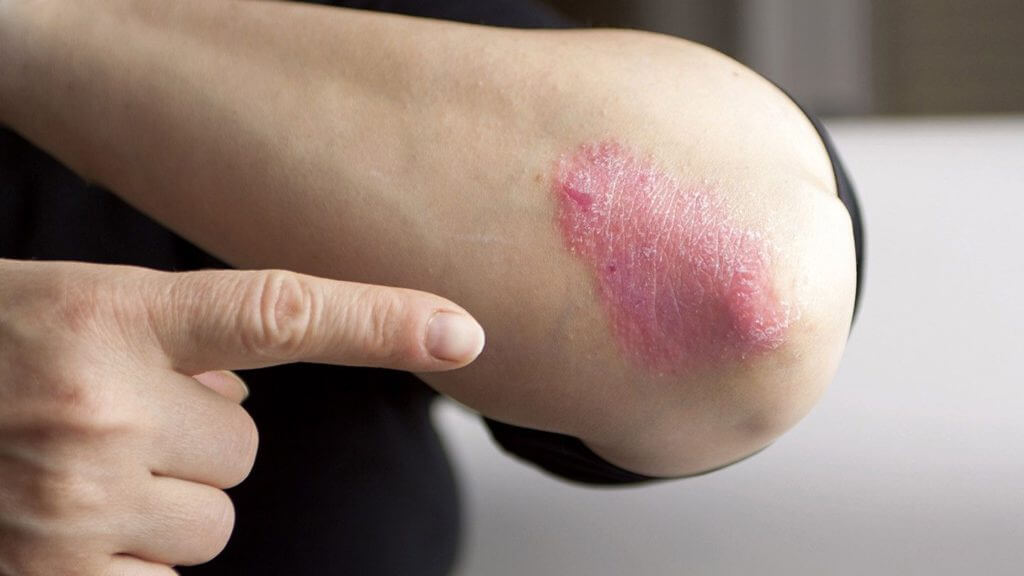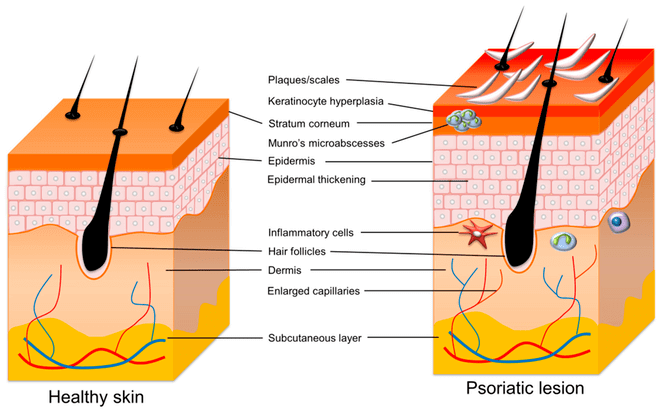
What is psoriasis?
Psoriasis is a common skin condition, affecting 2-3% of the general population. It is characterized by scaly erythematous plaques of various sizes and clinical forms, which protrude from the surface of the skin. It is found mainly on the elbows and knees, on the scalp, on the nails, but can extend and appear on any part of the body.
This skin disease is chronic, which means it subsides and reappears and the intervals during which the patient will be free of damage cannot be predicted. Mental stress is a factor that facilitates or causes the outbreaks of the disease, but it is not the only one. It is considered, today, a disease of the immune system and is familial, so it occurs more often in some families. Psoriasis is not transmitted to another person, while during the course of the disease it is possible that the joints become affected, so psoriatic arthritis develops. At the same time, there are increasing reports corelating psoriasis with other conditions, such as obesity, diabetes, atherosclerosis, cardiovascular disease, and depression.
Treatment of psoriasis
Effective, long-term and safe treatment of psoriasis has been and remains an important priority for dermatologists. New treatments may offer some solutions, but they are being evaluated as the experience of using them increases. It is important, however, to inform the public about psoriasis and our patients about the possibilities which now exist and may achieve a significant remission of the symptoms of the disease. Psoriasis is a chronic recurrent inflammatory and NON-TRANSMISSIVE skin disease, occurring in 1.5-3% of the general population. Psoriasis has been associated with a variety of extra-skin diseases and its effective treatment is crucial not only for ensuring healthy skin, but also for reducing extra-skin manifestations. The evolution of therapeutic agents now enables us to reduce the disease across the age range safely and effectively. These include topical and systemic therapies, biological factors, and specific wavelength light therapy.

Psoriasis significantly affects the patient’s quality of life. His social, professional and personal manifestations and activities are greatly affected, especially when the lesions of psoriasis develop in prominent places, such as e.g. on the hands or on sensitive areas, such as the genitals. In fact, large epidemiological studies conducted in many European countries, but also in our country, have revealed that psoriasis affects the quality of life of the patient much more than other more serious diseases of the body, such as heart attack, hypertension or pancreatic cancer and lungs.
Because psoriasis is a chronic condition, there is no single cure that can lead to a permanent remission of the disease. There are, however, many topical formulations, and many oral medications.
Medication of psoriasis
In recent years, new drugs have been developed by biotechnological methods. These drugs have a specialized action against certain proteins that play a greater or lesser role in the pathogenesis of psoriasis. These drugs are administered subcutaneously or intravenously and are particularly effective and safe, such as etanercept, infliximab, antalimumab, ustekinumab, secukinumab, and brondalumab, as well as apremilast, which is administered orally. In fact, it seems that they can offer a significant remission of the disease for longer periods of time, while our experience from their administration is constantly increasing and enriched with observations and data from the treatment of other autoimmune diseases.

More specifically, one of the most recent drugs is secucinumab, which, according to accompanying clinical studies, seems to be a useful treatment option for some patients. The therapeutic results gathered from its use indicate that it could help us, alone or in combination with other treatments, and in areas difficult to treat the disease, such as the scalp, nails, palms and soles. These effects seem to be maintained over time, without the drug losing much of its effectiveness.
Our Contacts
Contact us!
Agias Sofias 28, Thessaloniki
info@dermaesthetichair.gr
(+30) 2310 282.292 & (+30) 2310 250.300

